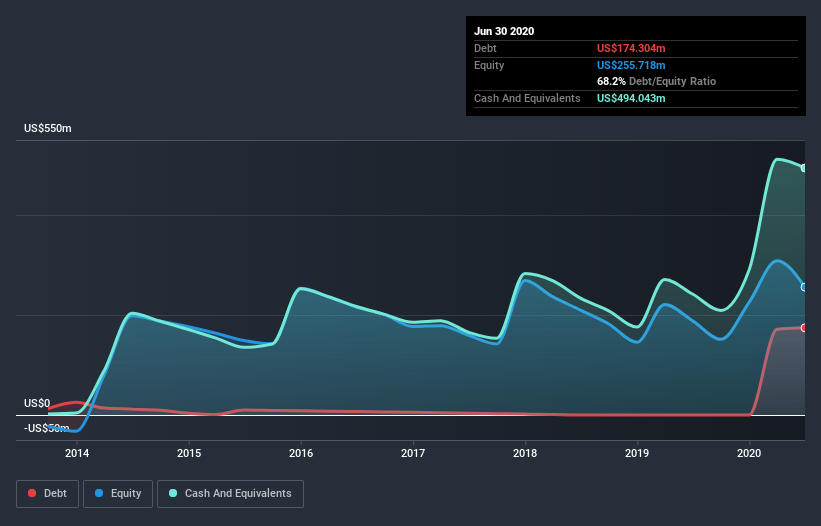Does Revance Therapeutics (NASDAQ:RVNC) Have A Healthy Balance Sheet?

The external fund manager backed by Berkshire Hathaway's Charlie Munger, Li Lu, makes no bones about it when he says 'The biggest investment risk is not the volatility of prices, but whether you will suffer a permanent loss of capital.' When we think about how risky a company is, we always like to look at its use of debt, since debt overload can lead to ruin. We note that Revance Therapeutics, Inc. (NASDAQ:RVNC) does have debt on its balance sheet. But is this debt a concern to shareholders?
When Is Debt Dangerous?
Debt and other liabilities become risky for a business when it cannot easily fulfill those obligations, either with free cash flow or by raising capital at an attractive price. If things get really bad, the lenders can take control of the business. While that is not too common, we often do see indebted companies permanently diluting shareholders because lenders force them to raise capital at a distressed price. Having said that, the most common situation is where a company manages its debt reasonably well - and to its own advantage. The first thing to do when considering how much debt a business uses is to look at its cash and debt together.
Check out our latest analysis for Revance Therapeutics
How Much Debt Does Revance Therapeutics Carry?
The image below, which you can click on for greater detail, shows that at June 2020 Revance Therapeutics had debt of US$174.3m, up from none in one year. But it also has US$494.0m in cash to offset that, meaning it has US$319.7m net cash.
How Healthy Is Revance Therapeutics's Balance Sheet?
The latest balance sheet data shows that Revance Therapeutics had liabilities of US$48.0m due within a year, and liabilities of US$272.5m falling due after that. Offsetting this, it had US$494.0m in cash and US$49.0k in receivables that were due within 12 months. So it can boast US$173.6m more liquid assets than total liabilities.
This short term liquidity is a sign that Revance Therapeutics could probably pay off its debt with ease, as its balance sheet is far from stretched. Simply put, the fact that Revance Therapeutics has more cash than debt is arguably a good indication that it can manage its debt safely. There's no doubt that we learn most about debt from the balance sheet. But it is future earnings, more than anything, that will determine Revance Therapeutics's ability to maintain a healthy balance sheet going forward. So if you want to see what the professionals think, you might find this free report on analyst profit forecasts to be interesting.
It seems likely shareholders hope that Revance Therapeutics can significantly advance the business plan before too long, because it doesn't have any significant revenue at the moment.
So How Risky Is Revance Therapeutics?
We have no doubt that loss making companies are, in general, riskier than profitable ones. And we do note that Revance Therapeutics had an earnings before interest and tax (EBIT) loss, over the last year. Indeed, in that time it burnt through US$129.0m of cash and made a loss of US$209.3m. But the saving grace is the US$319.7m on the balance sheet. That kitty means the company can keep spending for growth for at least two years, at current rates. Even though its balance sheet seems sufficiently liquid, debt always makes us a little nervous if a company doesn't produce free cash flow regularly. The balance sheet is clearly the area to focus on when you are analysing debt. However, not all investment risk resides within the balance sheet - far from it. For instance, we've identified 4 warning signs for Revance Therapeutics (1 makes us a bit uncomfortable) you should be aware of.
At the end of the day, it's often better to focus on companies that are free from net debt. You can access our special list of such companies (all with a track record of profit growth). It's free.
This article by Simply Wall St is general in nature. It does not constitute a recommendation to buy or sell any stock, and does not take account of your objectives, or your financial situation. We aim to bring you long-term focused analysis driven by fundamental data. Note that our analysis may not factor in the latest price-sensitive company announcements or qualitative material. Simply Wall St has no position in any stocks mentioned.
Have feedback on this article? Concerned about the content? Get in touch with us directly. Alternatively, email editorial-team@simplywallst.com.

